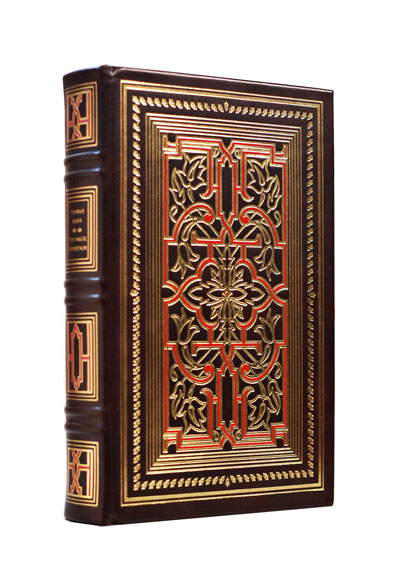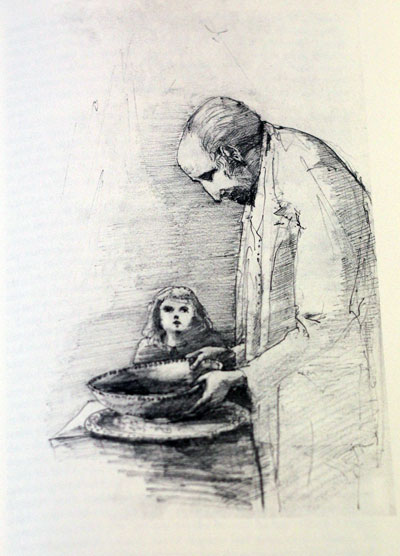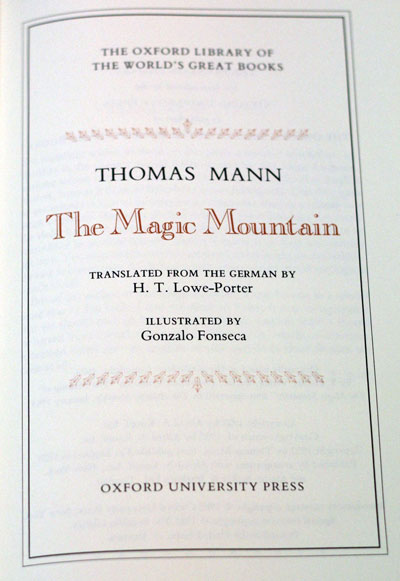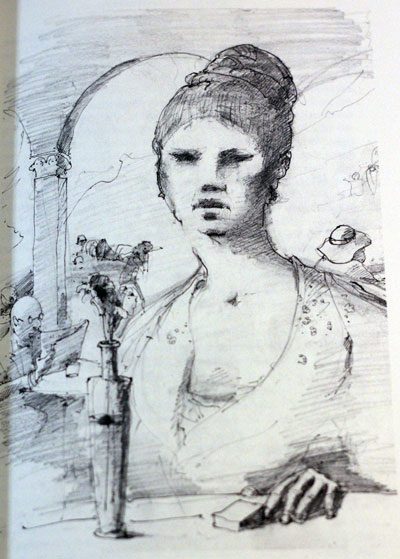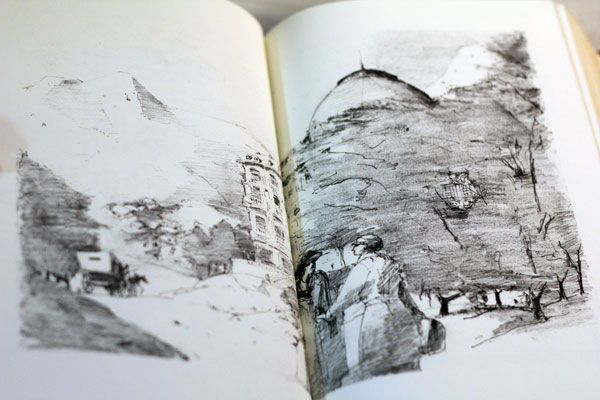About this edition:
This book is a triumph of book design and bookbinding, meant to last for generations. It features:
- Full top-grade leather binding
- Genuine 22k gold gilt to all edges, front design, spine, and back
- Marbled endsheets
- Satin bookmark, sewn-in
- Hubbed spine with raised bands
- Smyth-sewn binding for durability
- Premium acid-neutral archival paper that will not yellow
A writeup by a book collector at Librarything.com:
OXFORD UNIVERSITY PRESS AND FRANKLIN MINT: One Brief, Shining Moment
The Franklin Library, the publishing division of The Franklin Mint, was of course, at one time, the nation’s largest publisher of great books in fine bindings. Founded in 1973, it ceased publishing in 2000. Its early editions ~ fully bound in genuine premium-grade, hand-cut leather, selected for quality of grain and texture ~ were designed and bound by The Sloves Organization, Ltd., an affiliate of the mint, whose bindery was one of the few in the world devoted exclusively to the crafting of fine leather books.
Printed from 1981 to 1985,* the Oxford/Franklin volumes are gorgeous ~ absolutely stunning in their production qualities. Oxford University Press, in fact, specially chose the publishing division of The Franklin Mint to design and produce its World’s Great Books series because of Franklin’s unsurpassed skill in achieving a premium-quality product: each Oxford book must also be ‘a wonder’ in the finest of bookbinding traditions and, if possible, exceed Franklin’s high standard. By that prestigious election, Franklin thus was also doubly honored and formally recognized for the awesome reputation it had achieved in the publishing world throughout the decade of the 1970s.
It is because of that ‘brief, shining moment’ in publication history that these fine classic Oxford/Franklin editions generally surpass anything else ever produced either before or after that time by any of today’s renowned publishing giants. Relatively few titles in the multi-edition Great Books series were given the fabulous full-leather treatment; most were quarter-bound volumes ~ very lovely indeed by the lights of their own publication merits ~ but still unable to boast the same ‘Rolls Royce’ elegance of their full-leather counterparts.
About the Book (from wikipedia):
The Magic Mountain (German: Der Zauberberg) is a novel by Thomas Mann, first published in November 1924. It is widely considered to be one of the most influential works of 20th century German literature.
Mann started writing what was to become The Magic Mountain in 1912. It began as a much shorter narrative which revisited in a comic manner aspects of Death in Venice, a novella that he was then preparing for publication. The newer work reflected his experiences and impressions during a period when his wife, who was suffering from a lung complaint, was confined to Dr. Friedrich Jessen’s Waldsanatorium in Davos, Switzerland for several months. In May and June 1912 Mann visited her and became acquainted with the team of doctors who were treating her in this cosmopolitan institution. According to Mann, in the afterword that was later included in the English translation, this stay became the foundation of the opening chapter (Arrival) of the completed novel.
The outbreak of the First World War interrupted work on the book. The conflict and its aftermath led the author to undertake a major re-examination of European bourgeois society, including the sources of the willful, perverse destructiveness displayed by much of civilised humanity. He was also drawn to speculate about more general questions surrounding personal attitudes to life, health, illness, sexuality and mortality. Given this, Mann felt compelled to radically revise and expand the pre-war text before completing it in 1924. Der Zauberberg was eventually published in two volumes by S. Fischer Verlag in Berlin.
Mann’s vast composition is erudite, subtle, ambitious, but, most of all, ambiguous; since its original publication it has been subject to a variety of critical assessments. For example, the book blends a scrupulous realism with deeper symbolic undertones. Given this complexity, each reader is obliged to weigh up the artistic significance of the pattern of events set out within the narrative, a task made more difficult by the author’s irony. Mann himself was well aware of his book’s elusiveness, but offered few clues about approaches to the text. He later compared it to a symphonic work orchestrated with a number of themes and, in a playful commentary on the problems of interpretation, recommended that those who wished to understand it should read it through twice.
About the Author (from wikipedia):
Paul Thomas Mann (1875 – 1955) was a German novelist, short story writer, social critic, philanthropist, essayist, and the 1929 Nobel Prize in Literature laureate. His highly symbolic and ironic epic novels and novellas are noted for their insight into the psychology of the artist and the intellectual. His analysis and critique of the European and German soul used modernized German and Biblical stories, as well as the ideas of Goethe, Nietzsche and Schopenhauer.
Mann was a member of the Hanseatic Mann family and portrayed his family and class in his first novel, Buddenbrooks. His older brother was the radical writer Heinrich Mann and three of his six children, Erika Mann, Klaus Mann and Golo Mann, also became important German writers. When Hitler came to power in 1933, Mann fled to Switzerland. When World War II broke out in 1939, he moved to the United States, returning to Switzerland in 1952. Thomas Mann is one of the best-known exponents of the so-called Exilliteratur, literature written in German by those who opposed or fled the Hitler regime.

